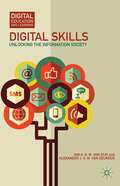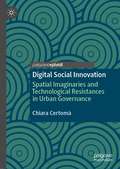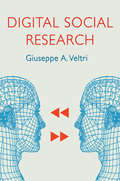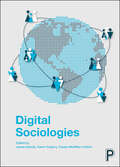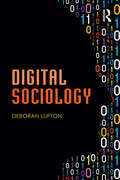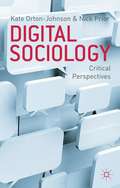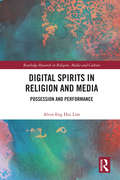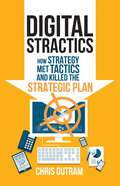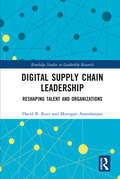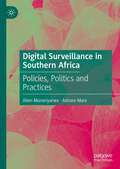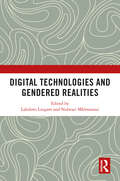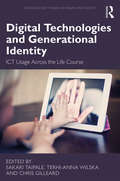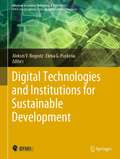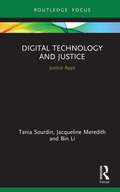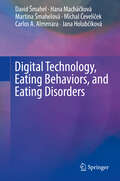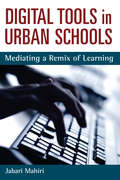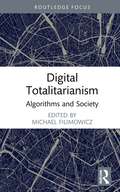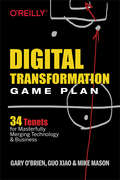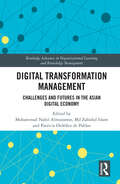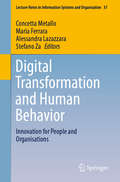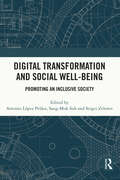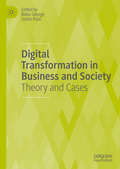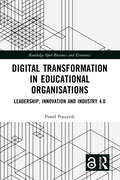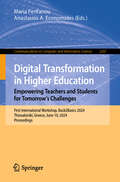- Table View
- List View
Digital Skills
by Jan A. G. M. van Dijk Alexander J. A. M. van DeursenThe first book to systematically discuss the skills and literacies needed to use digital media, particularly the Internet, van Dijk and van Deursen's clear and accessible work distinguishes digital skills, analyzes their roles and prevalence, and offers solutions from individual, educational, sociological, and policy perspectives.
Digital Social Innovation: Spatial Imaginaries and Technological Resistances in Urban Governance
by Chiara CertomàThis book engages the reader in exploring the relationships between digital social innovation initiatives and the city. It delivers a fresh, accessible and case-based discussion on the emergence of digitally-enabled social innovation practices in Europe that are redesigning the urban space and challenging the consolidated urban governance processes. By adopting a critical geography perspective, this ground-breaking analysis of digital social innovation provides the reader with an accessible overview of the way in which urban reproductive processes mobilise the physical and the virtual dimensions of the city and generate distinctive spatial configurations. Together with novel urban narratives and socio-technical imaginaries, these support the existing geometries of power or construct new ones. The author clearly describes contemporary cities as the new battlegrounds for controlling the digital sphere, shaped by the interplay between digital capitalism and resistance movements. In light of grassroots initiatives advanced by cyber-activists, e-makers and hackers, the book unveils the socio-political and cultural underpinnings of the revolution produced by the digital social innovations in the city and the socio-technological regimes supporting them. This author successfully sheds new critical light on traditional innovation studies exploring the debate on digital innovation through the lens of social and cultural geography providing an invaluable reference for those working in this field.
Digital Social Research
by Giuseppe A. VeltriTo analyse social and behavioral phenomena in our digitalized world, it’s necessary to understand the main research opportunities and challenges specific to online and digital social research. This book presents an overview of the many techniques that are part of the fundamental toolbox of the digital social scientist. Placing online methods within the wider tradition of social research methods, Giuseppe Veltri discusses the methodological principles and related frameworks that underlie each technique of digital research. This useful guide covers methodological issues such as different digital data types, sampling for big data, construct validity, and representativeness. It looks at different forms of unobtrusive data collection methods (web scraping, social media mining) as well as obtrusive methods (qualitative methods, web surveys, and experiments). Special attention is given to three key analytical approaches, explored in more detail: computational approaches to statistical analysis, text mining, and network analysis. Digital Social Research Methods will be a welcome and essential resource for students and researchers across the social sciences and humanities carrying out digital research or interested in the future of social research.
Digital Sociologies
by Jessie Daniels, Karen Gregory & Tressie McMillan CottomProviding a much needed overview of the growing field of digital sociology, this handbook connects digital media technologies to the traditional sociological areas of study, like labour, culture, education, race, class and gender. Rooted in a critical understanding of inequality as foundational to digital sociology and is edited by leaders in the field. It includes topics ranging from web analytics, wearable technologies, social media analysis and digital labour. This rigorous, accessible text explores contemporary dilemmas and problems of the digital age in relation to inequality, institutions and social identity, making it suitable for use for a global audience on a variety of social science courses and beyond. Offering an important step forward for the discipline of sociology Digital sociologies is an important intellectual benchmark in placing digital at the forefront of investigating the social.
Digital Sociology
by Deborah LuptonWe now live in a digital society. New digital technologies have had a profound influence on everyday life, social relations, government, commerce, the economy and the production and dissemination of knowledge. People’s movements in space, their purchasing habits and their online communication with others are now monitored in detail by digital technologies. We are increasingly becoming digital data subjects, whether we like it or not, and whether we choose this or not. The sub-discipline of digital sociology provides a means by which the impact, development and use of these technologies and their incorporation into social worlds, social institutions and concepts of selfhood and embodiment may be investigated, analysed and understood. This book introduces a range of interesting social, cultural and political dimensions of digital society and discusses some of the important debates occurring in research and scholarship on these aspects. It covers the new knowledge economy and big data, reconceptualising research in the digital era, the digitisation of higher education, the diversity of digital use, digital politics and citizen digital engagement, the politics of surveillance, privacy issues, the contribution of digital devices to embodiment and concepts of selfhood and many other topics. Digital Sociology is essential reading not only for students and academics in sociology, anthropology, media and communication, digital cultures, digital humanities, internet studies, science and technology studies, cultural geography and social computing, but for other readers interested in the social impact of digital technologies.
Digital Sociology
by Kate Orton-Johnson Nick PriorSociology and our sociological imaginations are having to confront new digital landscapes spanning mediated social relationships, practices and social structures. This volume assesses the substantive challenges faced by the discipline as it critically reassesses its position in the digital age.
Digital Spirits in Religion and Media: Possession and Performance (Routledge Research in Religion, Media and Culture)
by Alvin Eng LimIn many contemporary and popular forms of religious practice, digital technology and the spiritual are inseparable. Ranging from streaming broadcasts of spiritual possessions to screenings of mass prayer conferences in stadiums, spirits and divinities now have new forms in which they can materialise. By offering the notion of ‘digital spirits’, this book critically attends to the intersections of digital media and spiritual beings. It also puts forward a new performative perspective on how they interact. Taking cues from the work of Stewart Hoover and Heidi Campbell, among others, the book begins with an outline of the current debates around religion, performance and digital media. It then moves on to examine how mediality and religion, where embodied practices are carried out alongside virtual practices, work together in contemporary Asia. These case studies focus on lived religious practices in combination with various forms of media, and so help demonstrate that digital technology in particular reveals the layered processes of spirituality in practice. Gods and divinities have always relied on media to manifest, and this book is a fascinating exploration of how digital media has continued that tradition and taken it in new directions. As such, it will be of great interest to scholars of religious studies, digital media and performance studies.
Digital Stractics: How Strategy Met Tactics And Killed The Strategic Plan
by Chris OutramIn the world of digital business, the line between strategy and tactics is blurring. Traditionally large companies would adopt strategic frameworks which planned over three- to five-year timescales, while most digital start-ups had little interest in comprehensive and rigorous strategic processes and simply set themselves vision and worked out how to get there along the way. In today's digital economy even large companies are finding that their planning horizons are being measured in months rather than years or quarters (if not yet in the weeks or even days of startups). On the other hand, investors are less swayed by the excitement of 'digital' and expect harder and more rigorous medium term planning from start-ups. As a result, while the empirical process of learning by doing is becoming part of traditional companies' strategy processes, digital pure plays are no longer just making it up as they go along, but actively learning and changing as they go along. In short: on the battlefield of online commerce, strategy blends with tactics. Indeed, the distinction between pure play and hybrid is increasingly redundant as more holistic business models begin to emerge. Digital Stractics captures the experience and insights of some 60 entrepreneurs, CEOs and chairmen of both pure plays and hybrids to formulate frameworks within which both pure plays and hybrids can shape their strategy and business models. As timescales between 'plan' and 'do' collapse strategy and tactics have to blend. The world of STRACTICS is upon us.
Digital Supply Chain Leadership: Reshaping Talent and Organizations (Routledge Studies in Leadership Research)
by Murugan Anandarajan David B. KurzStrong leadership is necessary to drive the transformational change required to build and apply digital capabilities across organizations. Digital transformation in the supply chain is a leadership problem first and foremost. This book draws out some of the key digital business strategies supply chain leaders must become familiar with as they take on the responsibilities of leading transformations within their firms. The central rationale of the book is to establish a clear business case for the performance shifts and opportunities of the Digital Supply Chain. The benefits of a digital supply chain for firms can be summarized as uniquely reducing the amount of trade-off between costs and customer satisfaction. The challenges, complexity, and management involved in transforming to a digital supply chain have slowed many firms in their implementation. The key to unlocking this value and advantage is a new, robust, and digitally aware supply chain leadership mindset. It will provide readers with a practical Digital Supply Chain Leadership Road Map that will accelerate actions in technology, analytics, talent and business models. The road map to digital transformation will step the reader through these critical dimensions and illustrate how they can support their own organizational transformation by developing greater levels of maturity. This book will be most valued by supply chain leaders in medium to large scale organizations, as well as consultants and academics interested in digital business and supply chain transformation. The book will also be valuable for students studying digital transformation, supply chain, and operations.
Digital Supply Chain Leadership: Reshaping Talent and Organizations (Routledge Studies in Leadership Research)
by Murugan Anandarajan David KurzStrong leadership is necessary to drive the transformational change required to build and apply digital capabilities across organizations. Digital transformation in the supply chain is a leadership problem first and foremost. This book draws out some of the key digital business strategies supply chain leaders must become familiar with as they take on the responsibilities of leading transformations within their firms.The central rationale of the book is to establish a clear business case for the performance shifts and opportunities of the Digital Supply Chain. The benefits of a digital supply chain for firms can be summarized as uniquely reducing the amount of trade-off between costs and customer satisfaction. The challenges, complexity, and management involved in transforming to a digital supply chain have slowed many firms in their implementation. The key to unlocking this value and advantage is a new, robust, and digitally aware supply chain leadership mindset. It will provide readers with a practical Digital Supply Chain Leadership Road Map that will accelerate actions in technology, analytics, talent and business models. The road map to digital transformation will step the reader through these critical dimensions and illustrate how they can support their own organizational transformation by developing greater levels of maturity. This book will be most valued by supply chain leaders in medium to large scale organizations, as well as consultants and academics interested in digital business and supply chain transformation. The book will also be valuable for students studying digital transformation, supply chain, and operations.
Digital Surveillance in Southern Africa: Policies, Politics and Practices
by Admire Mare Allen MunoriyarwaThis book critically examines the manifest and latent practices of surveillance in the southern African region, using case studies from South Africa, Zimbabwe, Zambia, Namibia, Botswana and Mozambique. The book demonstrates the growing role of super-powers in the construction and normalization of the surveillance state. It traces the digitization of surveillance practices to the rapid adoption of smart CCTV, facial recognition technologies and EMSI catchers. Through predictive policing mechanisms, state security agencies have appropriated digital media technologies for sentiment analysis, constant monitoring of digital footprints of security targets, and even deploying cyber-troops on popular social media platforms. The authors argue that surveillance practices have thus been digitized with deleterious impact on the right to privacy, peaceful assembly and freedom of expression in the region. Furthermore, they argue that specific laws and regulations governing surveillance practices in the region are lagging behind. Finally, the book demonstrates how digital surveillance have significantly infiltrated the political, economic and social fabric of Southern Africa. This book provides much needed systematic, cutting-edge research into the trends, practices, policies and geo-political interests at the center of surveillance practices in the region, providing a crucial link between human rights, such as freedom of privacy and expression, and political authoritarianism.
Digital Technologies and Gendered Realities
by Lakshmi Lingam and Nolwazi MkhwanaziThe book explores the varying experiences and engagement of youth with smartphones and digital technologies in India and South Africa. It examines the process of meaning-making (identity construction) garnered through smartphone technology — specifically relating to notions of love, sex, and sexuality.A keen reappraisal of the smartphone revolution, the essays underline the constant negotiations between technology and social institutions such as, family, schools, colleges\universities, religious groups, traditional community leaders, media, police, law, and governments. The volume looks at new forms of digital-based surveillance on girls, women and gender minorities and maps the responses of state, civil society and women’s movements in tackling the divergent narratives of freedom versus control; empowerment versus violence. It specifically looks at how concepts of ‘privacy’, ‘agency’, ‘autonomy’ and ‘consent’ are being framed in the legal arena regarding young women, which may or may not be empowering of their agency and choices.Challenging notions about gender, technology and society, this book will be of great interest to scholars and researchers of sociology and social anthropology, politics, gender studies, and Global South studies.
Digital Technologies and Generational Identity: ICT Usage Across the Life Course (Routledge Key Themes in Health and Society)
by Sakari Taipale Terhi-Anna Wilska Chris GilleardThe short lifetime of digital technologies means that generational identities are difficult to establish around any particular technologies let alone around more far-reaching socio-technological ‘revolutions’. Examining the consumption and use of digital technologies throughout the stages of human development, this book provides a valuable overview of ICT usage and generational differences. It focuses on the fields of home, family and consumption as key arenas where these processes are being enacted, sometimes strengthening old distinctions, sometimes creating new ones, always embodying an inherent restlessness that affects all aspects and all stages of life. Combining a collection of international perspectives from a range of fields, including social gerontology, social policy, sociology, anthropology and gender studies, Digital Technologies and Generational Identity weaves empirical evidence with theoretical insights on the role of digital technologies across the life course. It takes a unique post-Mannheimian standpoint, arguing that each life stage can be defined by attitudes towards, and experiences of, digital technologies as these act as markers of generational differences and identity. It will be of particular value to academics of social policy and sociology with interests in the life course and human development as well as those studying media and communication, youth and childhood studies, and gerontology.
Digital Technologies and Institutions for Sustainable Development (Advances in Science, Technology & Innovation)
by Elena G. Popkova Aleksei V. BogovizThis book focuses on digital institutions and the advanced technologies used on their basis, as well as their contribution to sustainable development in the unity of seventeen SDGs formulated by the UN, which is sequentially disclosed in six parts of the book. This book is dedicated to comprehensive coverage of the role of the digital economy in sustainable development and the offering of a set of scientific, methodological, and practical recommendations to increase the scale and effectiveness of this role. The first part explores the training of digital personnel for sustainable development, the second part reveals the regional features of Russia, and the third part describes the industry specifics of using digital technologies in entrepreneurship in support of sustainable development. The fourth part deals with financial, organizational, and managerial issues of using digital technologies in entrepreneurship in support of sustainable development, the fifth part is devoted to security, international factors, and risks, and the sixth part deals with the legal framework and state regulation of digital technologies and sustainable development institutions. The novelty of the book lies in its reliance on an institutional approach that allows rethinking and systematically studying the contribution of the digital economy to sustainable development. The book is aimed at scholars who will find in it an institutional understanding of the digital economy’s support for sustainable development and ways to improve it. The secondary target audience of the book is the subject of managing the sustainable development of the digital economy. For them, the book contains relevant and illustrative examples from practice and applied recommendations.
Digital Technology and Justice: Justice Apps
by Bin Li Tania Sourdin Jacqueline MeredithJustice apps – mobile and web-based programmes that can assist individuals with legal tasks – are being produced, improved, and accessed at an unprecedented rate. These technologies have the potential to reshape the justice system, improve access to justice, and demystify legal institutions. Using artificial intelligence techniques, apps can even facilitate the resolution of common legal disputes. However, these opportunities must be assessed in light of the many challenges associated with app use in the justice sector. These include the digital divide and other accessibility issues; the ethical challenges raised by the dehumanisation of legal processes; and various privacy, security, and confidentiality risks. Surveying the landscape of this emergent industry, this book explores the objectives, opportunities, and challenges presented by apps across all areas of the justice sector. Detailed consideration is also given to the use of justice apps in specific legal contexts, including the family law and criminal law sectors. The first book to engage with justice apps, this book will appeal to a wide range of legal scholars, students, practitioners, and policy-makers.
Digital Technology, Eating Behaviors, and Eating Disorders
by David Šmahel Hana Macháčková Martina Šmahelová Michal Čevelíček Carlos A. Almenara Jana Holubčíková“After decades of research on dysfunctional eating and lack of physical activity, research attention has finally turned to the role of digital technology in eating behaviors and eating disorders. This timely volume offers a thoughtful and wide collection of chapters discussing the possible effects of digital technologies, from those enhancing healthy eating behaviors to those that encourage disordered eating. Highly recommended for both professionals and scholars.” Prof. Giuseppe Riva, Università Cattolica del Sacro Cuore, Milan, Italy.This book examines in depth the multifaceted roles of digital technologies in the eating behaviors and eating disorders. Coverage reflects a broad theoretical and empirical knowledge of current trends in digital technology use in health behaviors, and their risks and benefits affecting wellbeing, with focus on eating behaviors and eating disorders. The authors use both qualitative and quantitative data to focus on the digital lived experiences of people and their eating related behaviors.Among the topics covered:The quality of eating-oriented information onlineTechnology, body image, and disordered eatingEating-oriented online groupsUsing mobile technology in eating behaviorsUsage of digital technology among people with eating disordersWhat healthcare professionals should know about digital technologies and eating disordersTechnology-based prevention and treatment programs for eating disordersA potential source of discussion and debate in various fields across the social sciences, the health sciences, and psychology, Digital Technology, Eating Behaviors, and Eating Disorders will be especially useful to students, academics, researchers, and professionals working in the fields of eating behaviors and eating disorders.
Digital Tools in Urban Schools: Mediating a Remix of Learning
by Jabari Mahiri"Today there is massive interest in how digital tools and popular culture are transforming learning out of school and lots of dismay at how digitally lost our schools are. Jabari Mahiri works his usual magic and here shows us how to cross this divide in a solidly grounded and beautifully written book. " ---James Paul Gee, Fulton Presidential Professor of Literacy Studies, Arizona State University "Digital Tools in Urban Schoolsis a profoundly sobering yet inspiring depiction of the potential for committed educators to change the lives of urban youth, with the assistance of a new set of technical capabilities. " ---Mimi Ito, Professor in Residence and MacArthur Foundation Chair in Digital Media and Learning, Departments of Informatics and Anthropology, University of California, Irvine "An uplifting book that addresses a critical gap in existing literature by providing rich and important insights into ways teachers, administrators, and members of the wider community can work together with students previously alienated---even excluded---from formal education to enhance classroom learning with appropriate digital tools and achieve inspiring results under challenging circumstances. " ---Colin Lankshear, James Cook University, and Michele Knobel, Montclair State University Digital Tools in Urban Schoolsdemonstrates significant ways in which high school teachers in the complex educational setting of an urban public high school in northern California extended their own professional learning to revitalize learning in their classrooms. Through a novel research collaboration between a university and this public school, these teachers were supported and guided in developing the skills necessary to take greater advantage of new media and new information sources to increase student learning while making connections to their relevant experiences and interests. Jabari Mahiri draws on extensive qualitative data---including blogs, podcasts, and other digital media---to document, describe, and analyze how the learning of both students and teachers was dramatically transformed as they utilized digital media in their classrooms. Digital Tools in Urban Schoolswill interest instructional leaders and participants in teacher preparation and professional development programs, education and social science researchers and scholars, graduate and undergraduate programs and classes emphasizing literacy and learning, and those focused on urban education issues and conditions.
Digital Totalitarianism: Algorithms and Society (Algorithms and Society)
by Michael FilimowiczDigital Totalitarianism: Algorithms and Society focuses on important challenges to democratic values posed by our computational regimes: policing the freedom of inquiry, risks to the personal autonomy of thought, NeoLiberal management of human creativity and the collapse of critical thinking with the social media fueled rise of conspiranoia. Digital networks allow for a granularity and pervasiveness of surveillance by government and corporate entities. This creates power asymmetries where each citizen’s daily ‘data exhaust’ can be used for manipulative and controlling ends by powerful institutional actors. This volume explores key erosions in our fundamental human values associated with free societies by covering government surveillance of library-based activities, cognitive enhancement debates, the increasing business orientation of art schools, and the proliferation of conspiracy theories in network media. Scholars and students from many backgrounds, as well as policy makers, journalists and the general reading public will find a multidisciplinary approach to questions of privacy and encryption encompassing research from Communication, Rhetoric, Library Sciences, Art and New Media.
Digital Transformation Game Plan: 34 Tenets for Masterfully Merging Technology and Business
by Mike Mason Gary O'Brien Guo XiaoThe Digital Age is having a broad and profound impact on companies and entire industries. Rather than simply automate or embed digital technology into existing offerings, your business needs to rethink everything. In this practical book, three ThoughtWorks professionals provide a game plan to help your business through this transformation, along with technical concepts that you need to know to be an effective leader in a modern digital business.Chock-full of practical advice and case studies that show how businesses have transitioned, this book reveals lessons learned in guiding companies through digital transformation. While there’s no silver bullet available, you’ll discover effective ways to create lasting change at your organization.With this book, you’ll discover how to:Realign the business and operating architecture to focus on customer valueBuild a more responsive and agile organization to deal with speed and ambiguityBuild next generation technology capability as a core differentiator
Digital Transformation Management: Challenges and Futures in the Asian Digital Economy (Routledge Advances in Organizational Learning and Knowledge Management)
by Patricia Ordóñez de Pablos Mohammad Nabil Almunawar Md Zahidul IslamThis book addresses key topics related to organization design and knowledge management in the digital economy with organizational context, particularly in Asia. Asian nations are moving fast toward the digital economy, within which the role of organization design and knowledge management is crucial to support innovative and creative ideas for meeting huge market opportunities where customers are ready for digitalization. The book conceptualizes organization design into three dimensions, people, information, and technology, and offers readers a unique valued insight, bringing new perspectives to understanding emerging business opportunities and challenges in Asia. It presents a valuable collection of 14 chapters with empirical studies from leading researchers. The book addresses digital transformation in companies and organizations in Asia, analysing how disruptive technologies can help them have more efficient organization processes, create innovative products and services, be more resilient and achieve sustainable goals in the post-pandemic time. It fills a gap in the market offering a valuable collection of chapters that combines strategic topics for companies, organizations and nations today, such as digital economy, disruptive technologies, big data and knowledge management, with a specific focus on the Asian region, providing rich examples and studies focused in countries and regions within Asia. Written for scholars, researchers and other specialists in digitalization, this book offers a unique collection of insights into the current and future situation in Asia.
Digital Transformation and Human Behavior: Innovation for People and Organisations (Lecture Notes in Information Systems and Organisation #37)
by Stefano Za Alessandra Lazazzara Concetta Metallo Maria FerraraThe digital transformation is impacting various aspects of how we live and work. Due to the pervasive effects of the digital revolution on firms and societies, both scholars and practitioners are interested in better understanding the key mechanisms behind the related challenges. This book presents a collection of research papers focusing on the relationships between technologies (e.g. artificial intelligence, social media, and the Internet of Things) and behaviours (e.g. social learning, knowledge sharing, and decision-making). Moreover, it provides insights into how the digital transformation may improve quality of personal life and work life within public and private organisations. The plurality of views offered makes this book particularly relevant for practitioners, companies, scientists, and governments. It gathers a selection of the best papers - original double-blind peer-reviewed contributions - presented at the annual conference of the Italian chapter of the AIS which was held in Naples, Italy, in September 2019.
Digital Transformation and Social Well-Being: Promoting an Inclusive Society
by Antonio López Peláez Sergei Zelenev Sang-Mok SuhThis is the first book to show how digitalisation and the better provision of information and communication technologies (ICTs) can improve access to a wide-range of social services, as well as make them more inclusive. Overcoming disparities across social groups using contemporary digitalisation models will have lasting consequences on social well-being and human welfare.Reflecting on current trends the authors vividly illustrate the collective, global nature of the challenge that digitalisation represents for providers, administrators and users of welfare services. It is important, therefore, to bear in mind the following for research design and practice: • Citizens' rights must be protected. • Consideration should be given to how the services provided can be improved by more effective use of ICTs. • Digital interventions require better service coordination in the setting of priorities and specific training in digital skills for service providers and service users. The chapters in this book address these problems and challenges in great depth, analysing the role of ICTs in promoting social inclusion and social welfare, drawing on examples of successful ICT applications around the world. The book contains country case-studies from the United States, Brazil, India, the Republic of Korea, Taiwan, Hong Kong (China), Zimbabwe, Morocco, Spain, Portugal, Ireland and Singapore and will be of interest to all scholars and students of social policy, to social work educators, and social care providers.
Digital Transformation in Business and Society: Theory and Cases
by Justin Paul Babu GeorgeThe digital traces that people leave behind as they conduct their daily lives provide a powerful resource for businesses to better understand the dynamics of an otherwise chaotic society. Digital technologies have become omnipresent in our lives and we still do not fully know how to make the best use of the data these technologies could harness. Businesses leveraging big data appropriately could definitely gain a sustainable competitive advantage. With a balanced mix of texts and cases, this book discusses a variety of digital technologies and how they transform people and organizations. It offers a debate on the societal consequences of the yet unfolding technological revolution and proposes alternatives for harnessing disruptive technologies for the greater benefit of all. This book will have wide appeal to academics in technology management, strategy, marketing, and human resource management.
Digital Transformation in Educational Organizations: Leadership, Innovation and Industry 4.0 (Routledge Open Business and Economics)
by Paweł PoszytekTechnological transformation should lead to enhance people’s potential and the development of their cognitive and social competences, especially those connected with effective communication on different levels. The COVID-19 pandemic has intensified all these processes and, for better resilience and effectiveness at work, it requires now different sets of competences. This book gives direct insight into changes that take place in education in the context of an unprecedented and rapid technological advancement, which requires the reorientation of goals and functions based on innovative, adaptive and flexible solutions – in most cases driven by individual leadership. It describes the way to reach this reorientation and shows through thorough research how educational leaders position themselves on this way in this fast-changing ecosystem. Exploring how educational leaders manage the challenges of digital transformation, using European collaborative projects, this research volume discusses how this process impacts the effectiveness and sustainability of organizational activities. Establishing a model for assessing digital transformation in educational organizations and evaluating the effectiveness of their leaders, it will be of value to researchers, academics, practitioners, and advanced students in the fields of leadership, organizational change, management of technology and innovation, and those interested in the development of education and the utilization of digitalization.
Digital Transformation in Higher Education. Empowering Teachers and Students for Tomorrow’s Challenges: First International Workshop, Back2Basics 2024, Thessaloniki, Greece, June 10, 2024, Proceedings (Communications in Computer and Information Science #2247)
by Maria Perifanou Anastasios A. EconomidesThis book constitutes the refereed proceedings of the First International Workshop on Digital Transformation in Higher Education. Empowering Teachers and Students for Tomorrow’s Challenges, Back2Basics 2024, held in Thessaloniki, Greece, on June 10, 2024. This workshop was part of the 20th International Conference on Intelligent Tutoring Systems (ITS 2024), which took place in Thessaloniki on June 10–13, 2024. The 06 full papers here were thoroughly reviewed and selected from a total of 09 submissions. This interdisciplinary event brought together researchers and educators from various European higher education institutions to address the challenges and opportunities of digital transformation in higher education (HE).
